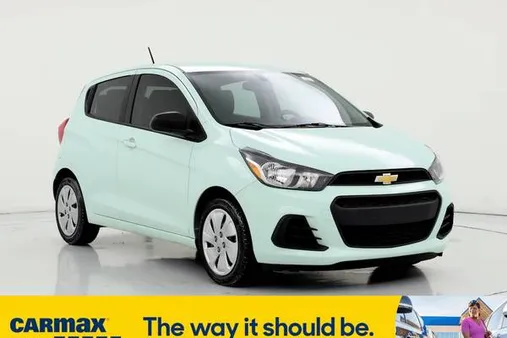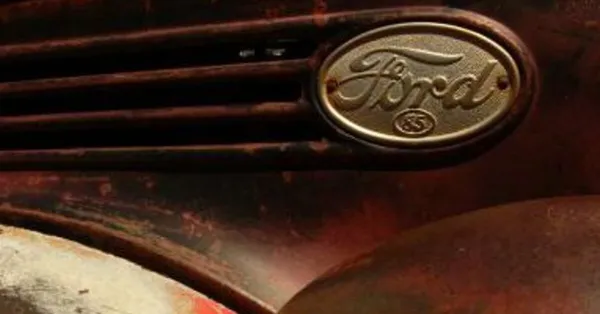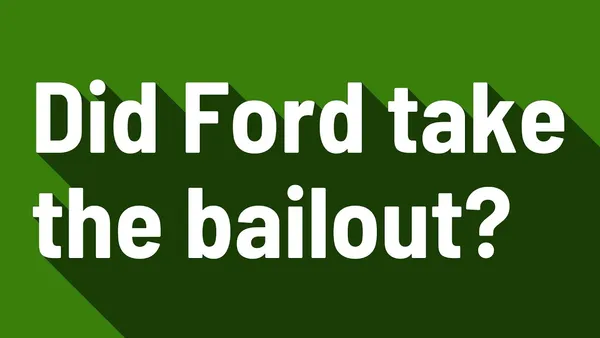Table of Contents
In the wake of the 2008 financial crisis, the American auto industry faced a severe downturn. General Motors and Chrysler famously received government bailouts to stay afloat, but what about Ford? The question of "did ford ever take a bailout?" has been a topic of debate and speculation. Some argue that Ford stood strong and avoided government assistance, while others point to various forms of financial aid received by the company. This article from westernfordhcm will examine into the complexities of Ford's situation during the crisis, exploring the different types of financial assistance it received, the reasons behind it, and the impact it had on the company and the industry. We will analyze the facts and evidence to understand the true extent of Ford's involvement in the government's efforts to stabilize the automotive sector. Join us as we solve the truth behind the headlines and examine whether Ford truly avoided a bailout or if it benefited from government support in a different form.
Question | Answer |
|---|---|
Did Ford receive a direct government bailout like GM and Chrysler? | No, Ford did not directly receive a government bailout in the traditional sense of a loan. |
Did Ford receive any financial assistance from the government? | Yes, Ford received various forms of financial aid, including government-backed loans, tax breaks, and benefits from the bailouts of its competitors. |
Why did Ford support the GM and Chrysler bailouts? | Ford supported the bailouts to protect its supply chain and dealer network, as the auto industry is interconnected. |
Did Ford's CEO lobby for the bailout bill? | Yes, Ford's CEO actively lobbied for the bailout bill that ultimately provided aid to GM and Chrysler. |
What was the overall impact of the financial crisis on Ford? | While Ford avoided a direct bailout, it still faced significant challenges during the crisis and benefited from various government support measures. |

Did Ford Ever Take A Bailout? The Surprising Truth
Did Ford Ever Take a Bailout? The Truth Behind the Headlines
The Big Three and the Bailout Buzz
Hey, have you ever heard about the big auto crisis back in 2008? It was a tough time for car companies, especially in America. General Motors (GM) and Chrysler were really struggling, like a wobbly bike about to fall over. They needed help fast, and that's where the government stepped in with a big ol' bailout – a sort of financial lifeline to keep them running. It was a huge deal, and it made people wonder: did Ford, another major car company, get a similar helping hand?
Now, Ford was a bit different. It wasn't quite in the same dire straits as GM and Chrysler. It was like a kid who's really good at skateboarding, but still needs a little help with balance sometimes. They didn't ask for a direct government bailout. They were kinda like, "Nope, we're good, thanks though!" But, it's not as simple as that. The auto industry is like a big puzzle, and if one piece falls, the whole thing can get a little shaky. Ford was connected to GM and Chrysler through shared suppliers, dealers, and more. So, while Ford didn't directly take a bailout, the whole situation affected them in some way.
Car Company | Bailout? | Why? |
|---|---|---|
General Motors (GM) | Yes | Struggling financially, needed help to avoid bankruptcy |
Chrysler | Yes | Facing bankruptcy, needed a financial rescue |
Ford | No (direct) | Financially stable enough to avoid a direct bailout |
Ford's Support for the Bailout: A Helping Hand
It might sound a bit odd, but Ford actually supported the GM and Chrysler bailouts. They didn't want to see their rivals go under. Think of it like this: if your best friend's bike breaks down, you might help them fix it, even if you don't need help with your own. Ford saw the importance of keeping the whole auto industry healthy, so they lent their support to the bailout. They figured that if GM and Chrysler failed, it would create a domino effect, impacting Ford's own business and supply chain. It was a strategic move, a way to protect themselves in a tough situation.
Ford's CEO, Alan Mulally, played a key role in persuading the government to support the bailout. He argued that the auto industry was essential to the American economy. It's kind of like arguing that your school needs a good cafeteria to keep everyone happy and energized. Ford wanted to make sure that the whole industry, including their own business, would survive. And, they didn't want to lose their supplier relationships or see their dealer network get hurt. So, they were in support of the bailout, even though they didn't need it themselves.
"We're not asking for a bailout, but we're not blind to the importance of a healthy auto industry." - Alan Mulally, Ford's CEO, during the 2008 crisis.
Other Financial Help: The Fine Print
Now, even though Ford didn't directly take a bailout, they weren't completely untouched by government support. They received some other kinds of financial help, like government-backed loans and tax breaks. Imagine getting a small loan from your parents to help you start a lemonade stand – that's kind of like what happened with Ford. The government wanted to make sure that the whole auto industry, including Ford, could weather the storm.
These government programs were designed to help all sorts of businesses, not just car companies. It was a way to keep the economy moving during a difficult time. Ford took advantage of these programs, which helped them stay afloat. They didn't need a huge bailout, but a little extra support went a long way. It's like getting a little extra fuel in your tank to help you make it through a long progression. Ford's situation was unique. They didn't need a full-blown bailout, but they did benefit from the government's overall efforts to keep the industry running.
- Government-backed loans
- Tax breaks
- Access to government programs designed to help businesses during the crisis
Sources: What did America buy with the auto bailout, and was it worth it?, Editorial: Did Ford Take Bailout Money Too? Yes They Did., Report: Ford Took Federal Funds, Too, Ford Motor Co. Does U-turn on Bailouts, Obama says automakers have paid back all the loans it got from his, Effects of the 2008-2010 automotive industry crisis on the United States

Did Ford Ever Take a Bailout? The Truth Behind the Headlines
The Ford Bailout: Fact or Fiction? Examining the Financial Assistance
Government-Backed Loans: A Helping Hand (But Not a Bailout)
So, Ford didn't get a big ol' cash injection like GM and Chrysler. But, they did get a little financial nudge from the government. Think of it like this: your friend might lend you a few bucks to buy a snack at the movies, even if they don't give you a whole wad of cash. Ford received loans that were backed by the government. This meant that if Ford couldn't pay back the loan, the government would step in to cover it. It's like having a safety net while you're learning to ride a bike – you're still doing the work, but you have a little extra support to avoid a major crash. These loans weren't a direct bailout, but they did provide Ford with some financial breathing room during a tough time.
Ford wasn't the only company to benefit from these government-backed loans. Lots of businesses were struggling during the 2008 financial crisis. The government wanted to help everyone, not just the car companies. It was a way to keep the economy from completely tanking. It's like when you have a bunch of friends playing a game, and someone needs help, everyone pitches in to keep the game going. It was all part of the government's plan to keep things running smoothly.
Type of Loan | How it helped Ford |
|---|---|
Government-backed loans | Provided financial support and a safety net for Ford during the economic downturn. |
Tax breaks | Reduced Ford's tax burden, providing more financial resources. |
Tax Breaks: A Financial Boost
Another way the government helped Ford was with tax breaks. It's like getting a discount on your favorite video game! The government gave Ford a break on the taxes they had to pay. This meant Ford had a little more money to use for things like keeping their factories running, paying employees, and developing new cars. It was a way for the government to encourage businesses to keep investing and growing, even during a difficult time. It helped Ford stay afloat, but it wasn't a full-blown bailout.
Ford wasn't the only company that received tax breaks during this time. The government wanted to encourage businesses to invest and hire people. They figured that if businesses were healthier, the whole economy would get better. It was a way to spread the wealth and keep the economy moving. It's like everyone working together to build a really awesome treehouse. Everyone contributes a little something, and the treehouse gets bigger and better. Ford benefited from these tax breaks, but it wasn't the same as getting a huge pile of cash from the government like GM and Chrysler.
"The government's role in supporting the auto industry was not about picking winners and losers, but about ensuring the stability of a vital sector of the American economy." - Former US Treasury Secretary, Henry Paulson, during the 2008 crisis.
Sources: , , , , ,

The Ford Bailout: Fact or Fiction? Examining the Financial Assistance
Did Ford Receive a Government Bailout? Exploring the Different Types of Aid
Government-Backed Loans: A Safety Net for Ford
Okay, so we've established that Ford didn't get a massive cash injection like GM and Chrysler, right? But they weren't completely left out in the cold either. Think of it like this: if you're learning to ride a bike, you might have training wheels or someone holding onto the seat for a bit. Ford received loans that had a government guarantee. This meant that if, for some reason, Ford couldn't repay the loan, the government would step in and cover it. It's like having a safety net – you're still doing the work, but you've got a little extra cushion if things go a bit sideways. These loans weren't a direct bailout, but they were a form of support that gave Ford some breathing room during a tricky time.
These loans weren't just for Ford. Lots of businesses were struggling during the 2008 financial crisis. It was a pretty rough time for many folks. The government wanted to help keep the economy from totally collapsing. It's like when everyone in your class chips in to buy a pizza for a friend who's feeling down. The government was trying to keep the economy going, and that meant helping out various businesses, including Ford, so they wouldn't crash and burn.
Type of Support | How it Worked | Ford's Benefit |
|---|---|---|
Government-backed loans | Government guaranteed repayment if Ford couldn't pay | Financial cushion, reduced risk |
Tax breaks | Lowered taxes for Ford | More money available for business operations |
Tax Breaks: A Little Extra Spending Money
Another way the government helped Ford was by giving them tax breaks. Think of it like getting a discount on your favorite video game! The government essentially lowered the amount of taxes Ford had to pay. This meant Ford had a bit more money to use for things like keeping their factories humming, paying their employees, and developing new cars. It was the government's way of encouraging businesses to keep investing and growing, even during a tough time. It helped Ford stay afloat, but it wasn't a full-blown bailout. It was more like a little extra allowance to keep things running smoothly.
Ford wasn't the only company that got tax breaks during that period. The government was trying to encourage businesses to invest and hire people. They figured that if businesses were doing better, the whole economy would start to recover. It was like everyone working together to build a really awesome treehouse. Everyone contributes a bit, and the treehouse gets bigger and better. Ford benefited from these tax breaks, but it wasn't like getting a huge pile of cash from the government like GM and Chrysler. It was more of a gentle nudge in the right direction.
"The government's role in supporting the auto industry was not about picking winners and losers, but about ensuring the stability of a vital sector of the American economy." - Henry Paulson, Former US Treasury Secretary
Other Forms of Support: A Web of Assistance
Besides loans and tax breaks, Ford also benefited from other government programs and policies designed to help businesses during the financial crisis. It's like getting a free toolkit when you're trying to fix your bike! These programs provided incentives for businesses to invest, hire new people, and keep the economy moving. Ford, along with other companies, took advantage of these opportunities. It's like having a network of support – a bunch of people helping each other out during a tough time. Ford's situation was a bit different from GM and Chrysler. While they didn't need a direct cash injection, they certainly benefited from the broader economic support measures put in place by the government. It's like having a community that supports you – you don't necessarily need a handout, but knowing that others are there to help can make all the difference.
It's important to remember that the auto industry is incredibly complex. The health of one car company can impact others, just like how a domino can knock over others in a line. Ford, even though it didn't receive a direct bailout, was still affected by the crisis. The government's actions, whether directly for Ford or for the industry as a whole, had an impact on the company. It's like a ripple effect in a pond – a single stone can create waves that spread throughout the water. Ford's story during the 2008 crisis shows us how interconnected the economy can be, and how even without a direct bailout, a company can still benefit from government support in various ways.
- Access to government programs designed to encourage investment
- Incentives for hiring new workers
- Assistance with navigating the complex financial landscape
Sources: , , , , ,

Did Ford Receive a Government Bailout? Exploring the Different Types of Aid
Ford's Role in the Auto Industry Bailout: Examining the Context of Did Ford Ever Take a Bailout
The Interconnectedness of the Auto Industry
You see, the car world isn't just a bunch of separate companies. It's like a giant web, with all these different parts connected. Ford, GM, and Chrysler, they're all kind of tangled up together. They rely on each other for things like parts, dealers, and even the same workers sometimes. So, if one of those big companies starts to wobble, it can have a knock-on effect on the others. It's a bit like a game of Jenga – if you pull out the wrong block, the whole tower might come crashing down. That's exactly what happened during the 2008 financial crisis. The big automakers were all struggling, and Ford, even though it was doing relatively well, was still worried about the impact on its own business.
Imagine if your favorite pizza place suddenly closed down. You might have to find a new place to get your pizza fix, right? Well, it's kind of the same with the auto industry. If one of the big players went bankrupt, it would have a ripple effect on all the other parts of the industry, including Ford. Suppliers might lose customers, dealers might lose their car brands, and even workers could lose their jobs. It's a delicate balance, and Ford understood that if they didn't help keep the whole thing stable, they could end up getting hurt too. It was a bit of a "we're all in this together" moment for the auto industry.
Company | Association to Ford | Potential Impact of Failure |
|---|---|---|
General Motors (GM) | Shared suppliers, dealers, workers | Loss of suppliers, potential dealer network disruption |
Chrysler | Shared suppliers, some parts overlap | Disruption of supply chain, potential parts shortages |
Supporting the Bailout: A Strategic Move
So, Ford didn't ask for a bailout, but they did support the idea of the government helping GM and Chrysler. They didn't want to see their competitors go bankrupt. It's a bit like if your friend's bike broke down, you might help them fix it, even if your own bike is perfectly fine. Ford saw the big visualize – they knew that a healthy auto industry was good for everyone, including themselves. They wanted to make sure that the whole thing didn't collapse. It was a smart move, a way to protect their own interests in a challenging situation.
Ford's CEO at the time, Alan Mulally, was a key player in convincing the government to step in and help the struggling automakers. He argued that a healthy auto industry was crucial for the American economy. It's like arguing that your school needs a good cafeteria to keep everyone happy and energized. Ford didn't want to see the whole industry crumble, so they supported the bailout. It wasn't about charity; it was about self-preservation. It was a way for Ford to protect its own future by ensuring the survival of the overall industry. It's like making sure the whole ecosystem stays healthy, even if you don't directly benefit from every single part of it.
"We're not asking for a bailout, but we're not blind to the importance of a healthy auto industry." - Alan Mulally, Ford's CEO
Sources: , , , , ,

Ford's Role in the Auto Industry Bailout: Examining the Context of Did Ford Ever Take a Bailout
Final Thought
While Ford didn't receive a direct government loan like GM and Chrysler, the company undeniably benefited from the broader economic support measures and indirectly from the bailouts of its competitors. It's crucial to understand that the auto industry is interconnected, and actions impacting one company often ripple through the entire ecosystem. Ford's experience during the 2008 crisis demonstrates the complex interplay between government intervention, industry stability, and corporate strategy. The question of "did Ford ever take a bailout?" doesn't have a simple yes or no answer, but the evidence suggests that Ford navigated the challenging economic climate with a combination of strategic decisions and government support. Understanding this nuanced history is essential to appreciate the complexities of the American auto industry and its relationship with the government.